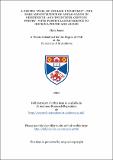Files in this item
A deeper "Well of English undefyled" : the role and influence of Anglo-Saxon in nineteenth- and twentieth-century poetry : with particular reference to Hopkins, Pound and Auden
Item metadata
| dc.contributor.advisor | Alexander, Michael | |
| dc.contributor.author | Jones, Chris | |
| dc.coverage.spatial | 317 p. | en_US |
| dc.date.accessioned | 2018-06-28T12:11:54Z | |
| dc.date.available | 2018-06-28T12:11:54Z | |
| dc.date.issued | 2002 | |
| dc.identifier.uri | https://hdl.handle.net/10023/14708 | |
| dc.description.abstract | This thesis challenges the assumption that Chaucer is the father of the living English poetic tradition. Nobody would deny that poetry existed in a form of English before the fourteenth century, but it is commonly assumed that linguistic and cultural changes have made Anglo-Saxon poetry a specialist area of concern, of no use or interest to modern poets. It is demonstrated that during the nineteenth century, advances in linguistic and textual scholarship made Anglo-Saxon poetry more widely available than had been the case, probably since the Anglo-Norman period. Knowledge of Anglo-Saxon literature is subsequently communicated to poets, particularly after the subject is institutionalized in English departments at British and American universities. Chapter One charts this rise in awareness of Anglo-Saxon poetry and considers its effects on several nineteenth-century poets (William Barnes, Henry Longfellow, Alfred Tennyson and William Morris). Major studies then follow of Gerard Hopkins, Ezra Pound and W. H. Auden and the uses that they make of Anglo-Saxon in their own poetry. It is argued that through these writers Anglo-Saxon has had a more important impact on modern poetry than has been thought previously. Moreover, Anglo-Saxon is often included as part of a poetics that might be called 'modernist'. For each of the three poets under study, the nature of their contact with Anglo-Saxon poetry is determined from documentary evidence (whether at university, or via secondary literature), and different stylistic debts are examined by close readings of a number of poems. No previous work has attempted a detailed analysis of the uses to which these three writers put Anglo-Saxon poetry. This thesis offers such an analysis and synthesizes the different approaches to Anglo-Saxon in order to provide an overview of this phenomenon in nineteenth- and twentieth-century poetry. | en_US |
| dc.language.iso | en | en_US |
| dc.publisher | University of St Andrews | |
| dc.subject.lcc | PR605.A6J7 | |
| dc.subject.lcsh | Hopkins, Gerard Manley, 1844-1889--Criticism and interpretation | en |
| dc.subject.lcsh | Pound, Ezra, 1885-1972--Criticism and interpretation | en |
| dc.subject.lcsh | Auden, W. H.| (Wystan Hugh), 1907-1973--Criticism and interpretation | en |
| dc.title | A deeper "Well of English undefyled" : the role and influence of Anglo-Saxon in nineteenth- and twentieth-century poetry : with particular reference to Hopkins, Pound and Auden | en_US |
| dc.type | Thesis | en_US |
| dc.type.qualificationlevel | Doctoral | en_US |
| dc.type.qualificationname | PhD Doctor of Philosophy | en_US |
| dc.publisher.institution | The University of St Andrews | en_US |
This item appears in the following Collection(s)
Items in the St Andrews Research Repository are protected by copyright, with all rights reserved, unless otherwise indicated.

